new posts in all blogs
Viewing: Blog Posts Tagged with: christian, Most Recent at Top [Help]
Results 1 - 25 of 180
How to use this Page
You are viewing the most recent posts tagged with the words: christian in the JacketFlap blog reader. What is a tag? Think of a tag as a keyword or category label. Tags can both help you find posts on JacketFlap.com as well as provide an easy way for you to "remember" and classify posts for later recall. Try adding a tag yourself by clicking "Add a tag" below a post's header. Scroll down through the list of Recent Posts in the left column and click on a post title that sounds interesting. You can view all posts from a specific blog by clicking the Blog name in the right column, or you can click a 'More Posts from this Blog' link in any individual post.

By: Carolyn Napolitano,
on 11/5/2015
Blog:
OUPblog
(
Login to Add to MyJacketFlap)
JacketFlap tags:
Books,
Religion,
Politics,
America,
christian,
mormon,
evangelical,
Republican party,
*Featured,
pentecostalism,
church of latter-day saints,
Arts & Humanities,
LDS Church,
bishop harry r jackson. jr,
Neil J. Young,
religious right,
Republican party politics,
The Religious Right and the Problem of Interfaith Politics,
We Gather Together,
Add a tag
For more than forty years now, the Religious Right has been a powerful force in the United States, helping reshape the Republican Party and realign the nation’s politics and culture.
The post Six predictions for the future of the Religious Right appeared first on OUPblog.
June 2 2015 – London – On social media late last night bestselling author E L James announced that she will shortly release a new version of her worldwide bestselling novel Fifty Shades of Grey — this time written from Christian Grey’s point of view. The new book, titled Grey, will be published on June 18th –a […]

By: Mark Miller,
on 5/14/2015
Blog:
From the land of Empyrean
(
Login to Add to MyJacketFlap)
JacketFlap tags:
movie,
psychology,
self-help,
self-improvement,
Mark Miller,
movie adaptation,
MillerWords,
Lazarus Filmworks,
forgiveness,
inspirational,
Christian,
healing,
Christianity,
Lazarus,
De Miller,
Christian teaching,
Add a tag
Here we go - the cover reveal and some exciting information about my newest book!
Gratitude Renewed is a personal journal of faith and healing. By journal, I mean that you, the reader, are going to be doing some of the writing. This book is meant as a tool to start your own journey of renewal. The idea for this book came from the Lazarus Filmworks motion picture God, Where Are You?, staring Wade Wilson and Kibwe Dorsey. My co-author on this book and father, De Miller, also wrote and directed the movie. In this movie, the main character feels that God has abandoned him. He then receives Gratitude Renewed as a gift with instructions to fill the pages with his life.
Gratitude Renewed will be available in paperback for you to do the same. If you know someone having troubles in their life, this book could be the blessing on which they are waiting.
Synopsis: This is not a traditional self-help book. It is a life plan designed to renew gratitude and strengthen faith. The authors of this book are not trained psychologists or ordained clergy (although they got lots of input from the pros). They are a father and son with a combined one hundred years (plus) experience of Life. They have faced challenges, experienced failure and explored their faith.
There are several journal pages included at the end of each chapter. They are intentionally left blank for you, the reader, to fill.
Gratitude Renewed is already garnering praise through reviews and endorsements:“It is well written and easy to understand and is prospectively a great self-help tool.”Theda Sturm, M.S., L.M.F.T., In Harmony Counseling
“Mark and De have a great gift in writing given to them by God. What a blessing...from God.”Gilbert Remington, Appointee Minister, Semi-Retired, Community of Christ Church
“Putting the principles from the book into action will renew the gratitude and help you discover the blessings in your life. I recommend this book to any individual that wants to live on the other side of why in a land called peace.” Mark Payne, Pastor, No Limits Church, Lake Mary, FL
“...an interactive challenge to their readers that will have them reexamining their lives and turning those lives around.” 5 StarsJack Magnus, Author, for Reader’s Favorite
“...a very motivational and positive read.” 5 StarsCharity Tober, Author, for Reader’s Favorite
“...you really feel like you’re learning something without a lot of extra noise...definitely a book I will hold onto for a long time.” 4 StarsSamantha Dewitt, Reviewer for Reader’s Favorite
(includes FREE shipping and a personalized autograph)
Coming soon to Amazon and other online book sellers

By:
Paula Becker,
on 4/24/2015
Blog:
Whateverings
(
Login to Add to MyJacketFlap)
JacketFlap tags:
kids,
cartoon,
comic,
General Illustration,
jesus,
Samples,
church,
christian,
paula j. becker,
paula becker,
sunday school,
ministry,
Cartoons & Comics,
children's ministry,
Heartmatters,
group publishing,
Add a tag
Below is a sample (in my cartoon-style) of a spot for the “Heartmatters” column I create illustrations for bi-monthly. All of these stories are uplifting and faith-building. I am blessed to be able to read this and then created illustrations to enhance the story.


If you’re going to be a Christian…then start representing! Stop moping around…giving people attitude…and complaining about every little thing that throws off your day. People are watching you.
How do you think you’ll ever be able to convince someone that they should investigate Christianity if their only interaction with Christianity is poor old you and your negative outlook on things? Have you ever considered that you’re actually hurting Christ more than helping him with how you treat other people? Do you think that showing up on Sunday and listening to the band or singing in the choir is going to bring others to Christ?
Christ said that you should “let your light so shine” so that others will want come unto Him.
Instead…you’re like a walking fire hydrant extinguishing any light that might be burning faintly within others.
So if you call yourself a Christian…then just start loving others and overlooking their faults. Quit trying to make everyone else pay for their sins. God’s got that under control. Become ambassadors of mercy instead heavenly bounty hunters and you’ll never have to beg someone to listen to your message about Christ again.
Source
Filed under:
Abundant Life 
By: Mark Myers,
on 12/21/2014
Blog:
(
Login to Add to MyJacketFlap)
JacketFlap tags:
Christian,
Dad,
daughters,
From the Writer,
children,
family,
cancer,
Christmas,
Health,
Relationships,
God,
parenting,
marriage,
Religion and Spirituality,
Kylie,
Add a tag
My wife sat at her laptop furiously compiling the lists for our four girls. She checked it once, then again while travelling to website after website scouring the internet for the best price and delivery. Items were added to baskets and carts checked out at such a frantic pace that I literally felt a warmth emanate from the credit card in my back pocket. Shopping at a fever pitch – Christmas delivered in two days or less. Not like most years, where she disappears for hours on end to find the perfect gift at the mall. She doesn’t have time for that this year because we got cancer for Christmas.
We d idn’t ask for it. It wasn’t circled in the wishbook or written in red crayon. No one sat on Santa’s lap and begged for it. No, cancer just showed up unannounced and took our year away.
idn’t ask for it. It wasn’t circled in the wishbook or written in red crayon. No one sat on Santa’s lap and begged for it. No, cancer just showed up unannounced and took our year away.
So rather than spending quality time with each of the girls to weigh their enormous wants against our limited budget as in years past, she spent Saturday morning hunting and pecking under great duress. Do they have the right size? Will it be delivered on time? Is that really something she will use or should we just give her cash?
At some point during the madness, I asked her what she wanted for Christmas. She paused to consider. Her eyes got red and her mouth failed her. She didn’t answer, but I knew. I knew what she wanted the second I asked the question and Amazon.com can’t deliver it, even though we are Prime members. It is the only thing either of us want.
We want our baby to stop hurting.
We want her to stop having to face treatments that make her sick and waste away.
We want her legs to work.
We want her to be able to go to school… to run, skip and play like every normal 12 year-old girl should.
We want her to stop coughing.
We want her hair to grow back so people don’t stare at her.
We want normal family time – not garbled, anxiety-laden, jumbled hodge-podge comings and goings where one is sick or two are missing for yet another appointment.
We want to relax and not worry.
We want to give cancer back.
I’ll take one of those please, Santa. Any size will do. No need to wrap it up because if you deliver it, the paper won’t last long. Oh, and you can ditch the receipt, I won’t be returning that gift.
I know many people are dealing with heartbreak and struggles. While Christmas is a season of love and giving, it also seems to magnify pain and loss. We don’t have the market cornered on hurt. I realize that.
It’s just that my wife loves Christmas so much. She loves everything about it, from finding the perfect, fattest tree to decorating every square inch of the house in some form of red and green. She loves the sound of the carols (save Feliz Navidad) and the smell of the baking, even though she is the one wearing an apron. She loves that, for the briefest of moments, the world focuses on the birth of our Savior. She loves taking a drive to see lights on houses and staying home with hot chocolate around a fire. She loves spending time with family, watching It’s a Wonderful Life, reading the nativity story, and candlelight Christmas Eve services. She loves the mad dash on Christmas morning to see what Santa brought… the joy and wonder on our children’s faces. She loves it all.

How do we do it this year?
Should we skip it?
Or should we cherish every moment together as the babe in the manger intended us to? Maybe, instead of focusing on what we’ve lost, we should hold on to the fragile remains of what we have – love, family, friends, and a newfound respect for the precious thing that is life. We should cling to our little girl, who, though frail, is fighting hard and encouraging others to do the same.
We aren’t alone. During the year, we’ve been welcomed into the country club no one wants to join – the childhood cancer community. While we are bound together by common tragedy, it is the warmest, most caring and wonderfully supportive group imaginable. It is the fraternity I wish I’d never pledged. Many of our new brothers and sisters are dealing with such incredible loss, and this time of year must certainly be crippling.
♦
When referring to the promised coming of the child in the manger, Isaiah said, “…and a little child shall lead them.”
What if we took a cue from our little child?
Although she is the one feeling the pain, nausea, and side effects of cancer, she is also the one most excited about Christmas. Even though she only had the strength to stand long enough to put a single ornament on the tree, she admires the finished product and loves to be in the den where she can see it. She is the one who insisted on taking decorations out of town with her while she has to be gone for treatment. She is the one snuggling her elves, dreaming about Christmas morning, and soaking up every minute of the nearness of family and Christ at this time of year. She holds a compress on an aching jaw with one hand and draws up surprises for those most dear with the other. In a year of typically rapid growth for a child her age, she weighs 75% of what she did last Christmas, yet she samples whatever treats her nervous stomach will allow. While we fret over diagnosis and treatment, she savors joy, plucks smiles from pain, and builds a resume of contentment that few on this earth have ever seen. Perhaps she has it right and we have it all wrong.

Kylie hanging her favorite ornament
Instead of looking to health and prosperity for our happiness, what if, just for a moment, we set aside our problems – however overwhelming, and looked to the manger, toward a child – with gratitude for his coming and a longing for his return? What if we laughed in the face of the enemy, knowing that we are wonderfully cared for and uniquely loved? What if we hoped, even when victory was uncertain? What if we dreamed of a better tomorrow regardless of what it may hold?
What if we smiled more…
♦
This joyous Christmas, our family holds on to hope. Together, we look to the manger, to Jesus Christ our Lord for strength and healing. We dream of the day when there is a cure – for our child & every child. We pray that next year, not a single family will have to unwrap cancer for Christmas.
Filed under:
From the Writer 


By: ChloeF,
on 12/12/2014
Blog:
OUPblog
(
Login to Add to MyJacketFlap)
JacketFlap tags:
Music,
Christmas,
Religion,
christian,
song,
VSI,
hymns,
Very Short Introductions,
catholic,
christmas carols,
*Featured,
Catholicism: A Very Short Introduction,
Add a tag
Carols bring Christians together around the Christ Child lying in the manger. During Advent and at Christmas, Christians everywhere sing more or less the same repertoire. Through our carols, we share the same deep delight at the birth of a poor child who was to become the Saviour of all human beings.
The carols are wonderfully ecumenical in their origins. Four verses and the tune of ‘Adeste Fideles’ (‘Come all ye faithful’) come from an eighteenth-century Roman Catholic layman, John Francis Wade. ‘Angels we have heard on high’ is a traditional French carol, now commonly sung to a tune arranged by Edward Shippen Barnes (d. 1958), an American organist and composer. The text of ‘Hark the herald angels sing’ was written by Charles Wesley. Its widely used melody is taken from Felix Mendelssohn, who was born into a Jewish family and brought up a Lutheran. Isaac Watts, a non-conformist, composed the words of ‘Joy to the world’. The music, although often attributed to George Frederick Handel, seems of be of English origin.
An Episcopalian bishop, Phillips Brooks, wrote ‘O little town of Bethlehem’, and the tune we normally hear accompanying this comes from Ralph Vaughan Williams.
‘Ding dong merrily on high‘ is sung to a dance tune from sixteenth-century France; the text was composed by an English enthusiast for carols, George Ratcliffe Woodward (d. 1934). We owe ‘Away in a manger’ to a nineteenth-century children’s book used by American Lutherans. The words for ‘See amid the winter’s snow’ were written by Edward Caswell, who became a Roman Catholic and joined Blessed John Henry Newman in the Birmingham Oratory. Sir John Goss, an Anglican organist and composer, provided the musical setting.
‘Silent night, holy night’ was the work of two Austrian Catholics, the priest and organist of a country church. An Irish Protestant, Nahum Tate, probably composed the text of ‘While shepherds watched their flocks‘, which is often sung to a tune taken from Handel.
These and other familiar carols have been composed by members of different Christian communities who lived in various parts of the world. The carols have also proved splendidly ecumenical in their use. No other collection of hymns are sung so widely by Christians when they celebrate one of the two central feasts of their liturgical year.
With a happiness that lights up their faces, Christians sing together the carols. With the birth of the Christ Child, light has replaced darkness, and real freedom has taken over from sin. The beautiful ‘Sussex Carol’ catches the common joy of Christian believers: ‘On Christmas night all Christians sing/To hear the news the angels bring/News of great joy, news of great mirth/News of our merciful King’s birth.’ The words of this carol go back to a seventeenth-century Irish bishop, Luke Wadding. In the early twentieth century, Vaughan Williams discovered the text and the tune that we use today, when he heard it sung at Monk’s Gate in Sussex. Hence it is called the ‘Sussex Carol’.
Such carols bring Christians together around the manger. They blend beautifully text and music to unite us all and lift our spirits at Christmas. But they also remind us that the shadow of the cross falls across the birth of Jesus.
Some carols foreshadow the suffering which the Christ Child will endure for all human beings. Thus the penultimate verse of the traditional English carol, ‘The first Nowell‘, declares: ‘and with his blood mankind has bought’. ‘In dulci jubilo’, a medieval German carol, arranged by J. M. Neale (d. 1866) and entitled ‘Good Christian men, rejoice’, subtly links Bethlehem and Calvary when the second verse repeats: ‘Christ was born for this.’
The carols that feature the Magi and the gifts they offer foretell the passion of Christ. Myrrh is an aromatic resin that was widely used in the Middle East to embalm corpses. From early times Christians understood that gift to symbolize the death and burial of Jesus. ‘We three kings of Orient are’, a nineteenth-century Christmas carol from Pennsylvania, devotes a whole verse to the gift of myrrh: ‘Myrrh is mine, its bitter perfume/breathes a life of gathering gloom/sorrowing, sighing, bleeding, dying/sealed in the stone-cold tomb.’ Such carols unite Christians with the Magi in worshipping the Christ Child, whose birth is already overshadowed by the cross.
When we sing our favourite carols this Christmas, let us rejoice in their very ecumenical origins and in their use by Christians everywhere. The carols light up our faces with vivid joy. But they also recall how the shadow of Calvary fell over Bethlehem. Jesus was born into a world of all-pervasive pain and suffering.
Featured image credit: Little Twon of Bethlehem, by Phillips Brooks. Public domain via Wikimedia Commons
The post Carols and Catholicism appeared first on OUPblog.

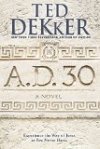
Author: Ted Dekker
Publisher: Center Street
Genre: Historical Fiction / Christian
ISBN: 978-1-59995-418-9
Pages: 432
Price: $25.00
Buy it at Amazon
Maviah was born of an illicit encounter by her father, Sheikh Rami bin Malik. Sold into slavery in Egypt, she lived there until the birth of her son, and was sent back to her Bedu people. Now her city has been taken by the Thamud, and her father has sent her on a mission to save them. With Saba, her father’s servant, and Judah, a Jew, she travels to see Herod, hoping for his help.
Saba and Judah are able-bodied and trustworthy men, and she soon comes to rely on them for her own well-being. But their mission runs into a snag. A side trip to Capernaum allows them to visit with Yeshua – a Jewish rabbi with a new and radical teaching. Maviah soon becomes convinced that this Yeshua speaks truth, and vows to follow his words.
Maviah is a broken woman who believes herself to be nothing more than a slave. But in speaking to Yeshua, she begins to believe she has value in her Father’s eyes. Can she trust him enough to overcome her fear and rescue her people?
A.D. 30 paints a wonderful picture of desert life at the start of the Christian era. We meet Jesus near the start of his ministry and share in the joy of those who have just found him. And we see, through Maviah’s eyes, exactly why he is so well-loved by his followers. Jesus loves her just as she is – even though she sees herself as unworthy.
I highly recommend this engaging and enjoyable book.
Reviewer: Alice Berger



Author: Jean M. Heimann
Publisher: Servant Books
Genre: Christian / Catholic
ISBN: 978-1-61636-845-6
Pages: 144
Price: $13.99
Author’s website
Buy it at Amazon
Most of us are familiar with the seven deadly sins, but are we also aware of the seven virtues? These are charity, chastity, diligence, humility, kindness, patience and temperance. The fastest way to defeat the deadly sins in our own lives is to work on developing these virtues in their place.
Seven saints provide wonderful examples of these virtues in action. In Seven Saints for Seven Virtues, these saints are presented for us to emulate. Their lives and struggles may have been difficult, but each overcame weakness and developed strong character. In addition to the saints, modern-day people who embody these virtues are introduced, so we can learn how to model them in today’s world. Prayers, suggested Bible reading, and action steps are also provided for developing each virtue.
We are all called to be saints. The lives of the virtuous men and women in this book will guide us as we attempt to follow that calling. All those who try to live holy lives will benefit from reading Seven Saints for Seven Virtues.
Reviewer: Alice Berger



Author: Vassula Rydén
Publisher: Alexian
Genre: Christian / Spirituality
ISBN: 978-0-9830093-0-6
Pages: 224
Price: $24.95
Author’s website
Buy it at Amazon
Vassula Rydén was not living a particularly religious life when her guardian angel first appeared to her. And when God spoke to her, soon after, she was completely unprepared to face her many sins and atone for them. Once she was cleansed, she willingly took on her new role in communicating God’s Messages to the people, as He commanded.
Heaven is Real But So is Hell is Rydén’s story of her ministry. It shares some of the visions God has allowed her to see, as well as many of the Messages she received. Organized loosely by topic, this book touches on all the important ideas God has commanded her to tell us.
Originally, the Vatican disapproved of Rydén’s Messages, issuing a warning against them. However, over time, these Messages have gotten support from priests, bishops, and even Cardinal Ratzinger, before he became Pope. Rydén also claims that many who have seen her speak or have read the Messages have come back to the Church as a result.
I admit, I approached this book with healthy skepticism. But as I’ve also read the Diary of Saint Maria Faustina Kowalska, I realized there are interesting similarities. Both women issued dire warnings that come with potential blessings if we turn from our sinful ways, and both have been ridiculed and scorned by an unbelieving public. I have not read True Life in God, which is Rydén’s official publication of these Messages, but from what I’ve read in Heaven is Real But So is Hell, I see nothing that would be contradictory to my Catholic faith.
Prophets are often misunderstood in the era they’re living in, and their messages are only understood much later. If these Messages are truly from God, they will stand up to the test of time.
Reviewer: Alice Berger



Author: Yira Bernard Jones
Illustrator: David C. Rhoades
Publisher: Lightning House
Genre: Children / Christian
ISBN: 978-0615632391
Pages: 32
Price: $12.00
Author’s website – buy it here
The fruits of the spirit are love, joy, peace, patience, kindness, goodness, faithfulness, gentleness, and self-control. In Stella Strawberry: The Fruit of Love, children are introduced to love.
This is not a fictional work, but instead it offers children various ways to look at love. Each concept is presented along with the corresponding Bible verse as reinforcement of God’s word to us on this subject. The final page is a prayer of thanks for God’s love and a request for help in loving others.
Stella Strawberry is beautifully written and illustrated, with a powerful message of God’s never-ending love for us and His demands that we show others that same love. This book would be a wonderful addition to any Christian home or Sunday School classroom.
Reviewer: Alice Berger


By: Mark Myers,
on 6/12/2014
Blog:
(
Login to Add to MyJacketFlap)
JacketFlap tags:
religion,
wikipedia,
humor,
research,
Hair,
google,
Christian,
Christianity,
Dad,
knowledge,
daughters,
grooming,
It Made Me Laugh,
Add a tag
“I can only find three leg hairs” observed my youngest from the back seat. The chemotherapy killing her tumors also attacks any fast-moving cells – thus the hair loss, fingernail lines, and white blood cell reduction. She is twelve and had kind of fuzzy, blond legs a couple of months ago. Her smooth legs weren’t troubling to her, just something she noticed.
“Well, that would come in handy if you cared about that stuff yet,” I said, glad she didn’t.
“Why do girls shave their legs anyway?” she wondered. “I mean, who started that whole thing?”
A very interesting question. Who did start that? I assume Eve had leg hair when Adam popped the question. Do you think when they ate from the tree, not only did they figure out they were naked, but Adam also noticed her furry legs for the first time? Did he made a snide remark about Eve being only a slight step up from his former companion, the chimpanzee? Every guy knows the remorse of SCS – Stupid Comment Syndrome. The moment you say something to your wife and immediately wish you could turn back time to retract it. Adam’s comment sent Eve into a tizzy trying to scrape the hair off with a stick while stitching together the fig leaf bikini we see in all the pictures. If God created enmity between woman and serpent, imagine the enmity Adam created with his wisecrack.
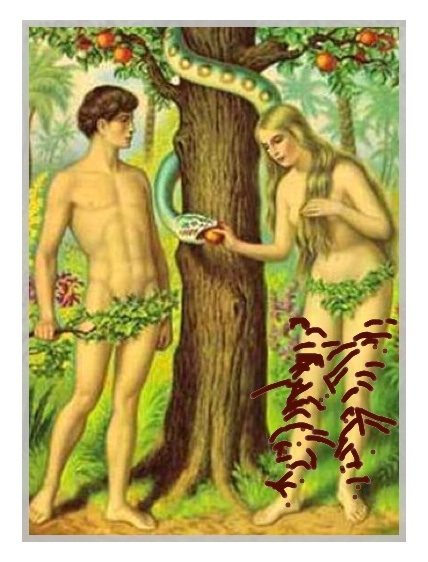
Ah, here is where I began a quest for knowledge. I had no interest in important knowledge, anyone can get that. The learning I sought is practically irrelevant outside of bar bets, board games, and trivia competitions. When did women first start shaving their legs?
Any thoughts?
Where do I turn? My best friends and cohorts in the immaterial: Google and Wikipedia, of course. Google brought me facts that I have to believe. It seems that women were so covered before the turn of the 20th century that it wasn’t necessary for them to shave – their body hair was kind of a honeymoon surprise. But as hemlines raised in the early 1900’s, razor sales increased. I can buy that.
The more compelling facts I found were about why women began shaving their underarm hair. They involve motion pictures, flappers, and old western women of ill repute. I would explain, but everyone likes a cliffhanger. My true audience is only twelve and wanted to know about leg hair anyway.
Besides, while on my search, I found a website called Mental Floss. It is like a Mythbusters of the inane. My evening was shot. I learned why bacon smells so good, 15 reasons we love Mr. Rogers, and why baby names have become increasingly female-sounding. Forget Wikipedia, some of that might actually be true. I have a new homepage!
After about three hours of copious research into absolutely nothing worthwhile, my daughter asked me why women started shaving their legs and I had to admit that I could tell her all why cows moo with accents, but had crammed so much useless knowledge into my finite brain, I had forgotten why women shaved their legs.
She left disappointed. Back to Wikipedia to start over…
But wait – an article titled, Do Racehorses Really Pee All That Much simply has to be read!
Filed under:
It Made Me Laugh 

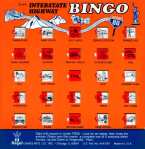 As a child of the 70’s, I can remember trips from Louisville to Denver every summer with nothing but Auto Bingo to keep us happy. Those were long trips. I’m sure Kansas is a fine place, but the interstate roadsides were vast wastelands to a hot, bored kid. My lovely wife drives a Honda Odyssey and we recently took it on vacation. The van has a DVD player in it for rear entertainment, which totally blows my mind. What I wouldn’t have given to have that in 1974!
As a child of the 70’s, I can remember trips from Louisville to Denver every summer with nothing but Auto Bingo to keep us happy. Those were long trips. I’m sure Kansas is a fine place, but the interstate roadsides were vast wastelands to a hot, bored kid. My lovely wife drives a Honda Odyssey and we recently took it on vacation. The van has a DVD player in it for rear entertainment, which totally blows my mind. What I wouldn’t have given to have that in 1974!
The kids decided to watch only Disney classic movies on the trip and chose Dumbo first. I love that movie and actually enjoyed listening to it from the driver’s seat. Most of the others lost too much of the story when I was blind to the action. I could follow Dumbo quite well while the miles rolled by.
The crows are my favorite part of the movie. While I understand the regrettable stereotype that some associate with them, I see them as deep and compelling characters. When I See an Elephant Fly might be my favorite Disney song. Although unintended by writers, their scene with Dumbo shows me two important lessons.
1. I believe people (and possibly crows) can change. When we first meet them, the crows are sarcastic and mock our hero’s dilemma until Timothy dresses them down for their behavior. Their response is one of true contrition and remorse as evidenced by the fact that they soon teach Dumbo to fly. The dialogue is priceless:
Crow: [as Timothy and Dumbo walk away sadly] Hey brother, now wa-wa-wait a minute. You don’t hafta leave feelin’ like that. We done seen the light. You boys is okay.
Timothy Q. Mouse: Please. You’ve done enough.
Crow: But we’s all fixin’ to ‘hep ya. Ain’t that the truth, boys?
Great line: “We done seen the light.” I once lived in darkness, but praise God, I saw the light. Light is available to anyone. It takes only a sliver of light to start a radical change.
2. I believe faith is more important than ability. No one really had any idea if Dumbo could fly. There was quite a risk in pushing him off a ledge with only a feather and his ears. But Dumbo believed that if he had the feather, he could fly.

Likewise, there is a point at the end of my ability where I need to trust in God’s plan for my life and His reckless love for me. Letting go of the ledge is incredibly hard, but success happens, not holding onto the ground for dear life, but out in the air with the feather. When He has promised to join me in flight, why would I stay on the ground?
Hebrew’s 13:5 says, “I will never leave thee, nor forsake thee.”
As I write this, I confess there are ledges that fear has me clinging to. I’m prayerfully inching closer to the edge.
What ledge are you holding onto?


I saw an odd sign today and had to investigate. It simply said:
Church for Rent
Because I have been told all my life that The Church isn’t a building, it is the body of believers, I found the rental concept intriguing. Remember the little folded hand thing little old ladies taught you in Vacation Bible School when you were six?
Here is the church
Here is the steeple
Open it up
And see all the people

How do you rent that? Are you renting people? Because that is clearly illegal and otherwise immoral. Hopefully, no kind of church (collection of believers) would do that.
Are you renting beliefs? Seems plausible, but slightly ridiculous since one church down the road is giving them away and on the other side on town there is one forcing them on any poor soul wandering past.
Maybe you are renting the building. Interesting…what do you do with a church building? This led to a whole other set of questions that forced me to survey the property. My initial investigation told me that this had been a Pentecostal church, most likely a Primitive Baptist church. I narrowed it down because of the booths that I found on the side, I think they are for potluck dinners and that is certainly a Baptist thing. I wiped a window and peeked inside to find a strange box next to the pulpit that I can only believe housed snakes in its day – thus the primitive. One other note, I live in the Deep South where you can’t swing a cat without hitting a Baptist church, so that is always the go-to denomination. (Yes, in this day and age, cat-swinging is discouraged, but only on Sundays with the blue laws and all.)
So if you are a Primitive Baptist Church and someone comes to rent your building (We will take the rental of members off the table because no one is going to pay for a bunch of staunchy guys yelling hellfire & brimstone at you, anyway), do you have a list of belief clauses the perspective renter has to adhere to before they can take over? I mean, you can’t let the building become a pool hall, bingo parlor, or a YMCA – which is just two towels short of a brothel. And what if a gaggle of Presbyterians comes along with their slick predestination/sovereignty of God talk and fermented drink? Do you even let them into the building? How about a flock of Methodists who debate the stickiness of salvation? Or God forbid, a cloister of Catholics? They would be crossing themselves, kneeling, and serving real wine in the very aisles that you used to charge up and down under the influence of the Spirit (not the alcoholic kind, the Holy kind). It flutters the mind to think of the radical change these denominations could bring to this sacred place.
The real question is, why does the church need to rent the space anyway? Tough times, I assume. But who holds the deed? The preacher, chairman of the deacons, or the head of the finance committee? If the church is caput, where does the rent money go? To the three guys probably responsible for its caputness?
You see the dilemma I’d fallen upon. You also know what all of these questions meant! I simply had to call the number. It rang four times and then to my disappointment, a nasally clerk named Eunice answered the phone with a boring explanation. It seems the church has been vacant for years and the city owns the property.
What seemed like a huge let-down led to one more question – where do they keep the charred remains of the poor slob who foreclosed on God?


Our cat is fascinated with doors. If one is closed, she sits staring at it or dig under it until it is opened. She may not see the room within as worthy of a visit once she can enter, but she wants the opportunity nonetheless. For us bipeds, what is it about open doors that stirs our curiosity? Who can walk down a hall of doors where most are closed and not peek inside the ones ajar? A hotel, office, hospital – wherever we are, we must look! What do we expect to find inside?
Don’t tell me you walk on focused with your eyes straight forward. I won’t believe you. I know you slow your pace slightly to get as much of a look as possible as you approach. Isn’t it awkward when you turn your head as you are walking past and end up looking face to face with someone whose expression is always, “why is this person staring at me?”
Uhhh, you left the door open!
When you were a kid, did you think of doors as some sort of portal with endless possibilities? Every door was a wardrobe that could take you to Narnia. Bugs Bunny cemented that feeling with the recurrent theme of being chased down a hall by coming and going through random doors completely out of time and sequence. The heart-shaped monster was my favorite chaser.

I heard a commotion in our den and opened the door of our bedroom recently to investigate. It was not a magic portal, but I did learn a lesson. One should always make sure they are fully dressed when exploring what may be beyond closed doors. That became a door one daughter wishes had remained closed and a memory her visitor wishes he could erase.
As I see it, there are a number of potential doors.
- Closed doors that should remain closed
- Closed doors that need to be opened
- Locked doors with no hope of admittance
- Locked doors to which we have the key
- Doors sealed for our protection
- Doors sealed for the protection of those inside
- Open doors that we should enter
- Open doors we should pass by
The list goes on, but you get my point. Life is a series of one door after another. When one comes to a life door, he or she should decide on the best and worse case scenarios before passing under the threshold. Count the cost, as it were. I currently find myself standing in front of an open door and I have yet to decide how great the cost of entry. It seems attractive, but I find myself somewhat intimidated by its potential. What I lack is discernment about this particular door, thus all of my musing about doors in general. And so, I sit at the frame and pray, think, and wonder what could be inside. It is daunting, but I remember James 1:5
If any of you lacks wisdom, you should ask God, who gives generously to all without finding fault, and it will be given to you.
I need wisdom. Either that or a heart-shaped monster to chase me in or away.


By: Mark Myers,
on 5/4/2014
Blog:
(
Login to Add to MyJacketFlap)
JacketFlap tags:
family,
Relationships,
religion,
parenting,
Men,
Christian,
Christianity,
fear,
Dad,
Fatherhood,
Religion and Spirituality,
Add a tag
We have entered some semblance of a routine around here. It isn’t like the old one, that routine is over for a while. Kylie and her mother being home allowed me to go for a nice six mile run. The weather is beautiful and it has been way too long since I’ve been out on the greenway. Of course, that led to some thinking (dangerous for me).
This might sound ridiculous, but we have all avoided public places since the diagnosis. Don’t get me wrong, everyone in our lives has been incredibly supportive. We all just find it tough to be in crowds. Her three sisters have had to go to school, so they have dealt with this quicker than I have. I have been working, but I work in a very small office so I don’t have to deal with crowds.
Yesterday, our dancer daughter had her ballet recital. My Lovely Wife and I split up and took in separate performances so one of us could stay with Kylie. While the dancers were beautiful, I found myself very sad when Kylie’s class was onstage. I couldn’t help thinking that she should be up there and I couldn’t take my eyes off of all of the perfect legs moving across the stage. Hers will be perfect again, it is just going to take time. I came in late and left quickly after it ended to avoid seeing too many people. What is that? Is that fear?
When did I start fearing? I’ve done some work in some of the worst slums in the world where fear should have been a legitimate reaction, but I felt a supernatural calm. What is this fear? Fear of people who care and show concern… What is that?
I am not an emotionally deep man, but I refuse to live in fear. That’s what I told myself as I ran today. Now, I have to decide what I am going to do about it. Am I going to be the leader hear, or keep using the three that have faced the crowds at school as shields because I am afraid?
When I am afraid, I will trust in you. In God, whose word I praise, in God I trust; I will not be afraid. What can mortal man do to me? Psalm 56:3-4
♦
♦
I’m going to church now. Big step? Not really, bu that’s what I am going to do. I am going alone because my older girls aren’t ready. I totally get that. But maybe I can deflect some of the questions today and next week they will want to go. I don’t know if that will work. Psychology isn’t my strong suit. But I won’t fear.


<!--[if gte mso 9]> Normal 0 false false false EN-US JA X-NONE <![endif]-->
Divine guidance and blessings come to each of us through little signs as we carry on through our busy lives. What is one to do when the hectic pace that threatens to exhaust us puts us in a tailspin of despair and unable to recognize God’s blessings? Please know you are not alone as you continue your journey. Nancy I. Sanders’ book, Depression What’s a Christian to Do? provides the reader with spiritual guidance and points of reference to guide you through a difficult period in your life. Sanders’ book is the perfect resource to align you to contentment and understanding in your life. A must read and ongoing reference for the roller coaster of life!
~~~~~~~~~~~~~~~~~~~~~~~~~
Best wishes,Donna M. McDineAward-winning Children's AuthorConnect with Donna McDine on Google+
A Sandy Grave ~ January 2014 ~ Guardian Angel Publishing, Inc.
Powder Monkey ~ May 2013 ~ Guardian Angel Publishing, Inc.
Hockey Agony ~ January 2013 ~ Guardian Angel Publishing, Inc.
The Golden Pathway ~ August 2010 ~ Guardian Angel Publishing, Inc.~ Literary Classics Silver Award and Seal of Approval, Readers Favorite 2012 International Book Awards Honorable Mention and Dan Poynter's Global e-Book Awards Finalist
By: Mark Myers,
on 4/22/2014
Blog:
(
Login to Add to MyJacketFlap)
JacketFlap tags:
children,
Books,
family,
fiction,
humor,
stories,
Church,
small town,
Southern,
Christian,
south,
Character Voices,
Religion and Spirituality,
preacher,
sermons,
Add a tag
Today, a word from the Reverend Josiah Crane, who has been the preacher of the Goose Creek Country Church in Portsong for as long as anyone can remember. He’s a masterful orator of the Scriptures, but could be described as somewhat distant when it comes to the shepherding side of his calling. In his own way, he cares for the souls of his flock very much.
◊

I see you there.
I know you are squirming in your seat and I know why. What I just said hit close to your wandering heart…that is what the bead of sweat on your forehead tells me. A more compassionate man might offer you his handkerchief to mop your brow. But I say, better a little sweat now than hellfire for eternity!
So while you think I am speaking to the back wall, know that both God and I have you in our sights. Neither of us is oblivious to what goes on in these holy pews. For example:
1. I know the children count the number of times I hit the pulpit every week and even play a little game with it. While I don’t condone wagering, I have stacked the odds for a couple of my favorite little lambs over the years.
2. I know precisely what time it is. If you think repeated checks to your wristwatch will give me a subtle hint, understand that it only makes me slow my pace. You’ll get to your precious lunch, even if the Lutherans beat you there.
3. You cannot hide your dozing off – see point one, that’s why I pound the pulpit. When your head bobs up and down, I assume you are agreeing with me, which stokes the fire of my verbosity.
4. I do not believe in alliterations or acrostics like some word game player. I’ve got the Scriptures on my side and I don’t even care for the little numbers that man added.
5. You are absolutely correct – I do, in fact, like to hear myself speak.
6. I will not tell you how old I am or what year I was born! Before you were, I was. No one is going to win that bet. You may as well put the proceeds into the offering basket. I am not older than dirt, but recall firsthand accounts of its creation.
So next time you think you are pulling one over on the old preacher, remember that I have been doing this a long time. Ecclesiastes chapter 1 and verse 9 tells us, “There is no new thing under the sun.” I’ve seen quite a few suns rise and fall. Further, I’ve seen all the tricks.
◊
I hope the old Preacher will forgive me the edits I made to his submission. He sent me 3491 words that I condensed after dozing off a few times. If you have any memories of being terrified by an old preacher, then you can identify with my friend, Virgil Creech – who is more than a little afraid of the Reverend Crane.

◊
Photo Credit: National Galleries of Scotland Commons from Edinburgh, Scotland, UK via Wikimedia Commons


By: Mark Myers,
on 4/13/2014
Blog:
(
Login to Add to MyJacketFlap)
JacketFlap tags:
God,
humor,
bible,
Faith,
Christian,
Christianity,
Obedience,
Dad,
husband,
Fatherhood,
Relationships,
father,
Add a tag
I like to think I was a good sitter for the kids when they were little. I mean, I’m dad, so I should be able to provide for their basic needs on occasion. I remember a particular Saturday when our first was a toddler. Instead of playing the usual dolls and house (which I was excellent at, by the way), I decided that her tummy, back, and arms made the perfect canvas for a jungle mural. It seemed like a good idea at the time. We drew and drew until elephants, lions, and zebras were marching all over her flesh. Great, giggly, tickly fun.
Great fun until Mom came home and the little fink sold me out. My lovely wife hadn’t gotten two steps into the kitchen before the scamp had pulled her shirt up to reveal the masterpiece. I don’t recall if it was the classic grocery bags hitting the floor or not, but her fury stretched across the room and melted part of my ear. Something about her perfect, beautiful baby looking like a tattooed Harley rider.
That was the day I received a fairly detailed list of appropriate activities for times when mommy was away. I also learned the difference between permanent and washable markers.
That was a “first child” thing. She’s mellowed about keeping them in pristine condition and maybe I’ve matured a little. Either way, I pale in comparison to the worst babysitter ever. Some of you look for deep meaning in Bible stories and I applaud you. My infantile mind reads some of the odd ones and starts playing Paul Harvey – looking for The Rest of the Story.
When I read Genesis 22, I am awed by Abraham’s obedience. To listen and follow God at the expense of the one thing he had waited a hundred years for, his baby boy, is incredible. For so long he had begged and schemed for a son, but couldn’t have one with Sarah until he completely gave up his own plans and got to a place where he put his utter reliance on God and not himself. Only God.

We know how the story goes. Just before he offers Isaac as the sacrifice, God shows him a ram to use as a substitute, sparing his son’s life. Can you imagine the sheer joy? Can you picture the relief of his heart? Do you think Isaac flinched when the knife went up? Do you wonder at what Sarah said when they got home?
Seriously, how do you relay that to your wife?
“Hi Honey, we’re home.”
“Oh, I missed you two so much. How was the camping trip?”
“It was fantastic. You’re never gonna believe what God did. First, he told me to sacrifice Isaac. So I built this altar and put him on it. Just as the knife was about to come down…”
“YOU DID WHAT???”
The Bible omits that part of the story. But I wonder sometimes.
I wonder what things I hold too dear to put on the altar. I certainly wouldn’t put my kids on there. (Heck, I won’t even draw on them anymore.) But there are other things too precious to me that I hold back. I know it – and so does God. Lord help me to have more faith and obedience like Old Abraham. I just pray I’m a better babysitter.
Artwork Credit: Ferdinand von Olivier [Public domain]


By: Mark Myers,
on 4/10/2014
Blog:
(
Login to Add to MyJacketFlap)
JacketFlap tags:
children,
family,
Health,
Friendship,
hope,
love,
cancer,
parenting,
Christian,
Christianity,
Dad,
Encouragement,
fight,
Fatherhood,
daughters,
Religion and Spirituality,
Dad stuff,
Add a tag
Where were you when you first heard the sound? Good sounds – your husband’s voice, your baby’s giggle, the words “I love you?” Do you remember? Can you picture the scene and surroundings?
I experienced a condensed courtship with my wife because I was briefly called back to service during Desert Storm. I don’t recall the first expression of the four- letter L word in our relationship. I know it came, and stuck. I have said it to her every day for nearly twenty-two years. I say it every night to my girls and sometimes in front of other people, much to their chagrin.
I wish I remembered the first time I said it, though.
I will never forget the first time I heard the word Cancer as it related to my family. I was in the hospital just a week ago when it was introduced to me, while my little girl lay sleeping nearby. The doctor actually used the words “oncological event” before I made him dumb it down for me. Cancer.
I held my wife in my arms as she collapsed into a puddle. Doesn’t cancer affect other families? Why would he be saying this word? I felt an instant dislike for this man, but my mind clouded to nothing. My wife’s head heaved in my chest. I couldn’t think in more than three word bursts. I have no idea how long we stood that way. I was roused only by the sound of a man pushing a cart way down at the end of the hall. The wheel squeaked as he carried out his task and I remember thinking, “How can he be pushing that? Doesn’t he know? It doesn’t matter where that squeaky cart is! Why isn’t he stopping?”
It was then I realized this isn’t everyone’s diagnosis. It is Kylie’s and ours: our family’s, our friends and network of support. But the rest of the world will continue to march on around us.
I will add a link to Kylie’s Caring Bridge at the end of this post because I won’t allow cancer to dominate my writing. It will peak its evil head in from time to time, I have no doubt. But I won’t allow it to take over my life, steal my joy, soil my faith, or crush my little girl.
It took a while to determine the enemy. Until then, we’ve been punching at shadows. Now we start to take it out. We are at the beginning of a long road, but there is hope. Kylie knows what is going on, she is scared. We cried together and prayed. She has decided that this is happening because God must have a really big, great plan for her. I don’t know if I could have gotten to those words so quickly at twelve – she’s just chock-full of amazing.

The picture I added is one of Kylie as Annie in her school play a couple of years ago. She is an incredible actress and I can’t wait to see her on stage again.
Because our minds are reeling right now, the verse we’ve been holding onto is Romans 8:26
Likewise the Spirit also helps in our weaknesses. For we do not know what we should pray for as we ought, but the Spirit Himself makes intercession for us with groanings which cannot be uttered.
♦
Thank you for your prayers and words of encouragement, friends. I have to go now, the bell just sounded for round one…
http://www.caringbridge.org/visit/kyliemyers


Isn’t God good? We got some cloudy, murky news yesterday that left me muddled. We don’t have enough information to worry yet. But the mind tends to wander through potential – all of the worse-case scenarios. When I finally got home, I sat thinking, “I need a verse.” But nothing would come to mind. My mind was literally empty. Tabula Rasa. Clean slate.
God didn’t let me flounder long. He reached into the blankness nearly instantly through a text message of an old friend who was praying with us.
Philippians 4:6-7
6 do not be anxious about anything, but in everything by prayer and supplication with thanksgiving let your requests be made known to God. 7 And the peace of God, which surpasses all understanding, will guard your hearts and your minds in Christ Jesus.
The lovely wife and I are rallying to get more testing today. We have made our requests known to Him. If you are a praying friend, I covet a word for my littlest, Kylie. She is a little worried and just wants her leg to stop hurting.

Artwork credit: Otto Greiner [Public domain], via Wikimedia Commons


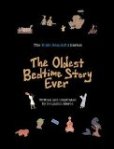
Author & Illustrator: Benjamin Morse
Publisher: Orson & Co.
Genre: Jewish / Christian (Bible Old Testament)
ISBN: 978-0-9858135-0-5
Pages: 77
Price: $30.00
Author’s website
Buy it at Amazon
Reading the Old Testament from start to finish is a monumental undertaking which few kids would ever consider. But The Oldest Bedtime Story Ever presents much of the story in an abbreviated and fun read.
Using paper cutout images, author Benjamin Morse crafts a unique book that highlights many of the more interesting Biblical stories. Beginning with Adam and Eve, Noah, and the patriarchs in Genesis, he takes us through the Exodus, the time of the judges, the Davidic and divided kingdoms, the exile, and the return from exile. Other important figures like Esther, Jonah, Samson, and Ruth are also featured.
This unique book is told with lightness and humor. For example, in the story of Adam and Eve, Morse states, “Life was so perfect and free of any troubles, they hardly knew what to do with themselves.” These brief commentaries made me chuckle, but also think more deeply about the scenes presented. Since no vignette is fully developed, this book might also encourage youngsters to delve into the actual Bible story for a better understanding of what happened.
I wasn’t sure what to expect from this book, but I was pleasantly surprised at its substance and accuracy. Anyone (not just kids!) who wants a nice overview of Bible history would do well to pick up a copy of The Oldest Bedtime Story Ever. It’s not only an enjoyable read, but also a great study book, since all scripture references are listed in the appendix. For those with hand-held devices, there is also an app available.
Reviewer: Alice Berger



Author: Joyce Magnin
Publisher: Zonderkidz
Genre: Middle-grade / Christian
ISBN: 978-0310733331
Pages: 224
Price: $14.99
Author’s website
Buy it at Amazon
Wilma Sue has been shuffled around the foster care system ever since she was born, spending time with various families and at the Daylily Home for Children. Now that her most recent home is no longer available, she finds herself staying with Ruth and Naomi, two missionaries who have recently returned from Africa.
If she expected a hum-drum life at Gray House, as she calls it, Wilma Sue is very mistaken. She’s expected to take care of the chickens, be nice to Penny Pigsworthy, and attend church with Ruth and Naomi. And she also helps Naomi bake cakes – those mysterious cakes that do unusual things to the recipients. Wilma Sue is determined to learn the secret ingredient. Will she ever find out?
In Cake, kids are gently reminded of how important it is to love and forgive others. This cute story will enchant middle-grade readers with love, chickens and a taste of peculiar.
Reviewer: Alice Berger



Author: Sheila Walsh
Publisher: Thomas Nelson
Genre: Children / Christian
ISBN: 978-1-4003-2293-0
Pages: 224
Price: $14.99
Buy it at Amazon
After a long day of school, friends, chores and play, a little girl needs to curl up in bed and be reminded of God’s love for her. Sharing God’s Little Princess Bedtime Devotional with mom or dad is the perfect ending to her busy day.
Topics like doing good for others, being obedient, being kind, and sharing God’s love, as well as many others are covered in each two-page devotional message. Bible verses in simple language introduce the topic, followed by a short message and a fun night-time activity, and then a closing prayer.
It’s hard growing up, and a girl needs a constant reminder that she is a child of God – our King’s little princess. This cute devotional book gives her a daily reminder that how she lives her life matters, and that she should always strive to act in a way that pleases God. I highly recommend God’s Little Princess Bedtime Devotional.
Reviewer: Alice Berger


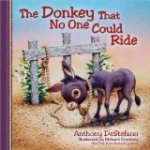
Author: Anthony DeStefano
Illustrator: Richard Cowdrey
Publisher: Harvest House Publishers
Genre: Children / Christian
ISBN: 978-0-7369-4851-7
Pages:32
Price: $14.99
Author’s website
Buy it at Amazon
A young donkey is weak and small, and no one is able to ride him. His owner gets frustrated at his uselessness, and ties him up on the edge of town. Then two men arrive and untie him, bringing him with them away from town. Worried and scared, he follows reluctantly.
The donkey has no idea that he has been chosen for a mighty purpose, and that Jesus intends to heal him first. Filled with renewed energy from the miracle he has received, the donkey proudly carries Jesus into Jerusalem.
The Donkey That No One Could Ride is a dramatized fictional tale told in rhyming verse from the donkey’s perspective. Kids will recall the events of Palm Sunday as they cheer for this poor outcast donkey. This book would make a great addition to any child’s Easter book collection.
Reviewer: Alice Berger


View Next 25 Posts






 idn’t ask for it. It wasn’t circled in the wishbook or written in red crayon. No one sat on Santa’s lap and begged for it. No, cancer just showed up unannounced and took our year away.
idn’t ask for it. It wasn’t circled in the wishbook or written in red crayon. No one sat on Santa’s lap and begged for it. No, cancer just showed up unannounced and took our year away.





















The nineteenth and early twentieth centuries were famously the age of “Bardolatry,” Shakespeare-worship that permeated artistic, social, civic, and political life. As Victorian scientific advances including Charles Darwin’s theory of evolution, published in On the Origin of Species (1859), destabilised Christianity as ultimate arbiter of truth, rhetoricians invoked Shakespeare’s plots and characters to support their arguments.
The post Shakespeare and the suffragettes appeared first on OUPblog.
Another week, another great staff member to get to know. When you think of the world of publishing, the work of videos, podcasts, photography, and animated GIFs doesn’t immediately come to mind. But here at Oxford University Press we have Jack Campbell-Smith, who joined the Social Media team as a Multimedia Producer just last year.
The post Catching up with Jack Campbell-Smith, Multimedia Producer appeared first on OUPblog.
This year’s International Law Weekend (ILW) will take place in New York City, from November 5th through 7th. Organized by the American Branch of the International Law Association and the International Law Students Association, this annual event attracts over 800 attendees including practitioners, diplomats, academics, and law students.
The post Preparing for International Law Weekend 2015 appeared first on OUPblog.
“Western clerical celibacy is in an unprecedented crisis,” says the conservative Catholic canon lawyer Edward Peters. The reason? Since the 1960s, the Catholic Church has permitted married men to be ordained as deacons, an order of clergy just below that of priests; and in the past 35 years about 100 married converts, all former Episcopal priests, have been ordained to the Catholic priesthood."
The post The future of married priests appeared first on OUPblog.
As a long-time student of politics I have often found myself assessing various kinds of attempts to create new democratic processes or arenas. From citizens’ juries through to mini-publics and from area panels to lottery-based procedures the scope of these experiments with ‘new’ ways of doing politics has taken me from the local ward level right up to the international level.
The post Raw politics: devolution, democracy and deliberation appeared first on OUPblog.
In a widely quoted interview with USA Today, Ben Bernanke said that ‘It would have been my preference to have more investigations of individual actions because obviously everything that went wrong or was illegal was done by some individual, not by an abstract firm.’ He makes it clear that he thought some Wall Street executives should have gone to jail.
The post Ben Bernanke and Wall Street Executives appeared first on OUPblog.
What role does international law play in addressing global problems? How can international lawyers innovate to provide solutions? How can they learn new approaches from different legal systems? Which fields require greater research and expertise?
The post What are the biggest challenges facing international lawyers today? appeared first on OUPblog.
It is said in the domestic practice of law that the facts are sometimes more important than the law. Advocates often win and lose cases on their facts, despite the perception that the law’s formalism and abstraction are to blame for its failures with regards to delivering justice.
The post The killing of Osama bin Laden: the facts are hard to come by, and where is the law? appeared first on OUPblog.
The term fragile state originated as an alternative to “failed state” – a worldview predominated by assertions about “weak” or “strong” states, with very weak states referred to as “failures”, “failed states", etc. A lot of critics rightly pointed out the naivete of a single dimension in conceptualizing the myriad ways in which states and societies can go wrong.
The post Fragile systems and development appeared first on OUPblog.
No issue in Mormonism has made more headlines than the faith's distinctive approach to sex and gender. From its polygamous nineteenth-century past to its twentieth-century stand against the Equal Rights Amendment and its twenty-first-century fight against same-sex marriage, the Church of Jesus Christ of Latter-day Saints (LDS) has consistently positioned itself on the frontlines of battles over gender-related identities, roles, and rights.
The post How much do you know about Mormon feminists? appeared first on OUPblog.
We are a weird species. Like other species, we have a culture. But by comparison with other species, we are strangely unstable: human cultures self-transform, diverge, and multiply with bewildering speed. They vary, radically and rapidly, from time to time and place to place. And the way we live - our manners, morals, habits, experiences, relationships, technology, values - seems to be changing at an ever accelerating pace. The effects can be dislocating, baffling, sometimes terrifying. Why is this?
The post “Challenging change” – extract from A Foot in the River appeared first on OUPblog.
S.B. 185, recently signed into law by California Governor Edmund G. (Jerry) Brown, Jr., requires California’s public employee pension plans to divest their investments in publicly-traded companies that derive half or more of their revenue from “the mining of thermal coal.”
The post California’s S.B. 185, thermal coal, and the fallacies of social investing appeared first on OUPblog.
Our legal history stretches back well over eight centuries. But however long this history may be, it is not one of which we can be universally proud, and the freedoms which we enjoy today have had to be hard won over the centuries.
The post The right to a fair trial: part one appeared first on OUPblog.
Depending on your tastes, bagpipes are primal and evocative, or crude and abrasive. Adore or despise them, they are ubiquitous across the city centers of Scotland (for tourists or locals?). In anticipation of St Andrews Day, and your Robert Burns poetry readings with a certain woodwind accompaniment, here are 10 facts you may not have known about the history of the bagpipes.
The post Ten fun facts about the bagpipes appeared first on OUPblog.
The conspirators in what we now know as the Gunpowder Plot failed in their aspiration to blow up the House of Lords on the occasion of the state opening of parliament in the hope of killing the King and a multitude of peers. Why do we continue to remember the plot? The bonfires no longer articulate anti-Roman Catholicism, though this attitude formally survived until 2013 in the prohibition against the monarch or the heir to the throne marrying a Catholic.
The post The literary fortunes of the Gunpowder Plot appeared first on OUPblog.
A debate over whether to remove lymph nodes from the neck during surgical treatment of early oral cancer has gone on for decades. Now findings from a randomized control trial reported last June at the American Society of Clinical Oncology’s (ASCO) annual meeting, in Chicago may finally put that controversy to rest.
The post Elective Neck Dissection in Early Oral Cancer: Debate Resolved appeared first on OUPblog.
The durable Bond is back once more in Spectre. Little has changed and there has even been reversion. M has back-morphed into a man, Judi Dench giving way to Ralph Fiennes. 007 still works miracles, and not the least of these is financial – Pinewood Studios hope for another blockbuster movie. Hollywood roll over and die.
The post Spectre and Bond do the damage appeared first on OUPblog.
What have the Romans ever done for us? Ancient Rome is well known for its contribution to the modern world in areas such as sanitation, aqueducts, and roads, but the extent to which it has shaped modern thinking about sexual identity is not nearly so widely recognized.
The post What have the Romans ever done for us? LGBT identities and ancient Rome appeared first on OUPblog.
With elections just about a year away, Americans can expect to hear a lot about regulation during the next twelve months—most of it from Republicans and most of it scathing. Republican frontrunner Donald Trump typifies the GOP’s attitude toward regulation.
The post Clean air… hot air appeared first on OUPblog.
His books are famous around the world, but their author struggles to get by – two themes that quickly become familiar to any reader. Martial has an eye for fabric. He habitually ranks himself and judges others by the price and quality of their clothing and accessories (e.g. 2.29, 2.57), a quick index in the face-to-face street life of the crammed metropolis.
The post Distinctive dress: Martial’s index to life in a crammed metropolis appeared first on OUPblog.
For a long time I have been dealing with the words bad, bed, bud, body, bodkin, butt, bottom, and their likes. The readers who have followed the discussion will probably guess from today’s title that now the time of path has come round.
The post Pathfinders appeared first on OUPblog.
It is hard to quantify the impact of ‘role-model’ celebrities on the acceptance and uptake of genetic testing and bio-literacy, but it is surely significant. Angelina Jolie is an Oscar-winning actress, Brad Pitt’s other half, mother, humanitarian, and now a “DNA celebrity”. She propelled the topic of familial breast cancer, female prophylactic surgery, and DNA testing to the fore.
The post The Angelina Jolie effect appeared first on OUPblog.
For more than forty years now, the Religious Right has been a powerful force in the United States, helping reshape the Republican Party and realign the nation’s politics and culture.
The post Six predictions for the future of the Religious Right appeared first on OUPblog.
Thank you to those of you who participated in the voting period for our Place of the Year 2015 longlist. The top five contenders have moved on to the next round into our shortlist, and we need your help again. If you're interested about each place and why each has been nominated for Place of the Year 2015, read back on our previous blog post. Vote for your pick in this year's shortlist by 30 November. The Place of the Year 2015 will be announced 3 December.
The post Announcing the Place of the Year 2015 shortlist: vote for your pick appeared first on OUPblog.
Long excluded from serious consideration within psychology and the neurosciences, consciousness is back in business. A new journal Neuroscience of Consciousness will catalyse this new understanding by publishing the best new research, review, and opinion on how our "inner universe" comes to be.
The post Can neuroscience explain consciousness? appeared first on OUPblog.
The October Revolution was probably the determining event of the twentieth century in Europe, and indeed in much of the world. The Communist ideology and the Communist paradigm of governance aroused messianic hopes and apocalyptic fears almost everywhere.
The post The day that changed the 20th century: Russia’s October Revolution appeared first on OUPblog.
The following extract is excerpted from Urban Legends: Gang Identity in the Post-Industrial City. The chapter, titled ‘Learning to Leisure’ traces the leisure lives of a group of young men from Langview, a deindustrialised working-class community in Glasgow.
The post (Getting a) Malling: Youth, consumption and leisure in the ‘new Glasgow’ appeared first on OUPblog.
Mormon feminism may seem to some a recent phenomenon, but events and writings in the history of Mormon feminism date back to the early 1970s. Here we have compiled these key moments in when Mormon women have engaged with question about gender in the Church of Jesus Christ of Latter-day Saints in a timeline of the pre-history and history of the Mormon feminist movement.
The post Key events and writings in contemporary Mormon feminism appeared first on OUPblog.
At the dawn of the children’s hospital movement in Europe and the West (best epitomised and exemplified by the opening of London’s Great Ormond Street Hospital for Sick Children (GOSH) on 14 February 1852), the plight of sick children was precarious at all levels of society. After a long campaign by Dr Charles West, Great Ormond Street hospital was the first establishment to provide in-patient beds specifically for children in England.
The post Charles West and Florence Nightingale: Children’s healthcare in context appeared first on OUPblog.
Listen closely and you’ll hear the squeak of sneakers on AstroTurf, the crack of a batter’s first hit, and the shrill sound of whistles signaling Game on! Yes, it’s that time of year again. As fall deepens, painted faces and packed stadiums abound, with sports aficionados all over the country (and world) preparing for a spectacle that is more than just entertainment. Which leads us to the following questions: What is the place of sports in our modern lives? And how should we understand it as part of our history?
In this month’s episode, Sara Levine, Multimedia Producer for Oxford University Press, sat down to discuss the evolution of our favorite pastimes with Chuck Fountain, author of The Betrayal: The 1919 World Series and the Birth of Modern Baseball, Julie Des Jardins, author of Walter Camp: Football and the Modern Man, Dr. Munro Cullum, a Clinical Neuropsychologist who specializes in the assessment of cognitive disorders, and Paul Rouse, author of Sport and Ireland: A History.
Image Credit: “Baseball” by Anne Ruthmann. CC BY NC 2.0 via Flickr.
The post Game on – Episode 28 – The Oxford Comment appeared first on OUPblog.
But what’s the right term, really? After all, much of the political disagreement and legal wrangling over this issue is rooted in this fundamental conceptual question, is “physician-assisted suicide” really suicide? Let’s see if we can figure it out.
The post ‘Death with Dignity': is it suicide? appeared first on OUPblog.
The traditional view of Shakespeare is that he was a natural genius who had no need of art or reading. That tradition grew from origins which should make us suspect it. Shakespeare’s contemporary Ben Jonson famously declared that Shakespeare had ‘small Latin and less Greek’.
The post Shakespeare the Classicist appeared first on OUPblog.
Psychologist Stephen P. Hinshaw, along with Pulitzer prize-winning journalist and author Katherine Ellison, authors of ADHD: What Everyone Needs to Know, answered a few questions for us in hopes of decluttering some information about ADHD.
The post Debunking ADHD myths: an author Q&A appeared first on OUPblog.
What is the future of academic publishing? We’re celebrating University Press Week (8-14 November 2015) and Academic Book Week (9-16 November) with a series of blog posts on scholarly publishing from staff and partner presses. Today, we present Oxford's list of ten academic books that changed the world.
The post 10 academic books that changed the world appeared first on OUPblog.
According to philosophical lore many sentences are self-evident. A self-evident sentence wears its semantic status on its sleeve: a self-evident truth is a true sentence whose truth strikes us immediately, without the need for any argument or evidence, once we understand what the sentence means.
The post Paradox and self-evident sentences appeared first on OUPblog.
We're getting ready for the annual American Musicological Society Conference, beginning 11 November 2015 in Louisville, Kentucky. From panels to performances, there's a lot to look forward to. We asked our past and present attendees to tell us what make AMS and Louisville such exciting places to be this month.
The post Preparing for AMS Louisville appeared first on OUPblog.
For over two centuries, newspapers were the dominant news medium. Yet today “dead tree” media-like stamp collecting is, well, so twentieth century. Now that millions of Americans get their news from social media on-line, newspapers have been in free-fall, prompting many pundits to wonder aloud if journalism has a future.
The post Does news have a future? appeared first on OUPblog.
What was happening in the world last year? Events such as the the devastating protest-turned-conflict in Ukraine, or the maritime disputes between states in the South China Sea, have wide-reaching repercussions - from the amount a country spends on its military, to the direction of foreign policies whole regions take.
The post International security and foreign affairs in 2014 [interactive map] appeared first on OUPblog.
What distinguishes good writing from bad writing? How can people transform their writing to make it more powerful and more effective? Are universities teaching students how to become better writers? In order to answer these questions and others, we sat down with Geoffrey Huck, an associate professor of the Professional Writing Program at York University.
The post What defines good writing? appeared first on OUPblog.
Many word games—Scrabble, Words with Friends, Scribbage, Quiddler and more, involve anagrams, or unscrambling letters to make a word. This month, we take a look at how to do that unscrambling, so here is an anagram for you to solve: naitp.
The post How to solve an anagram appeared first on OUPblog.